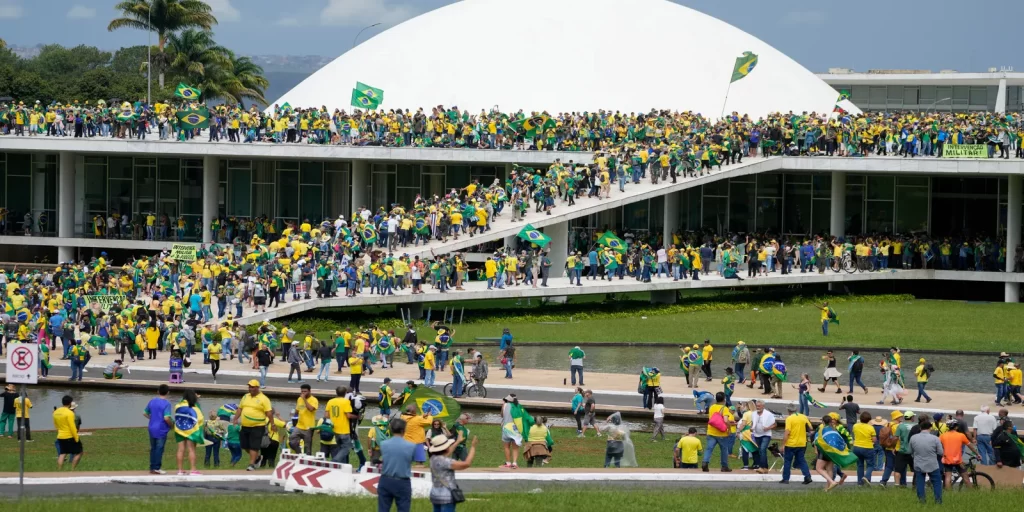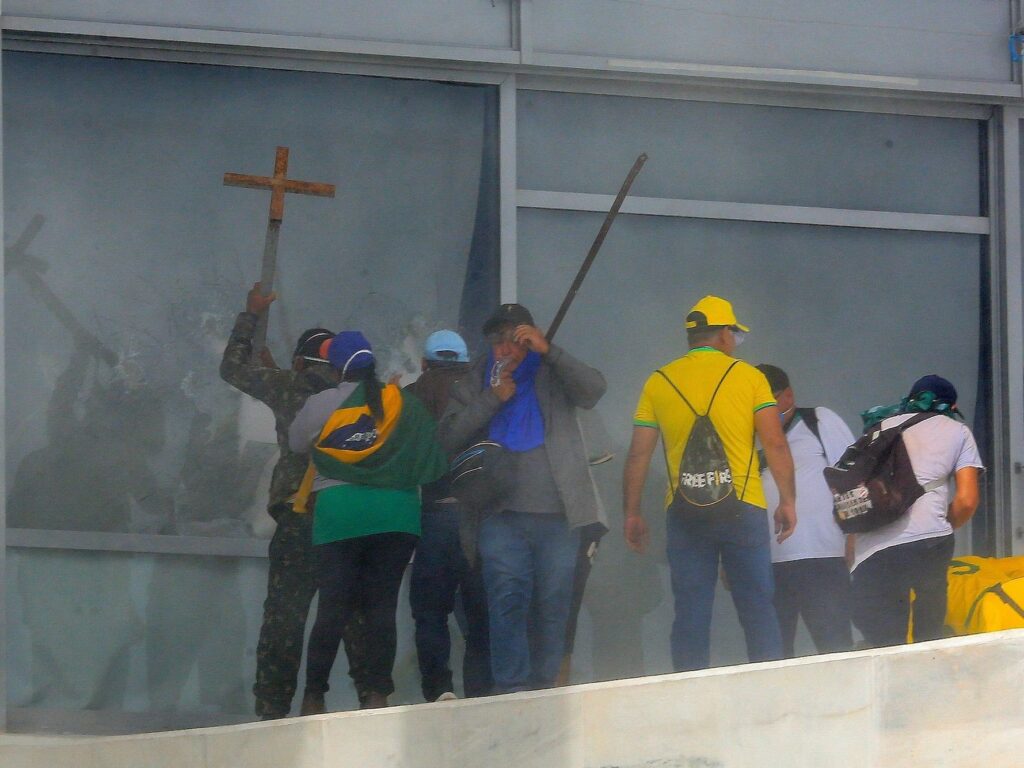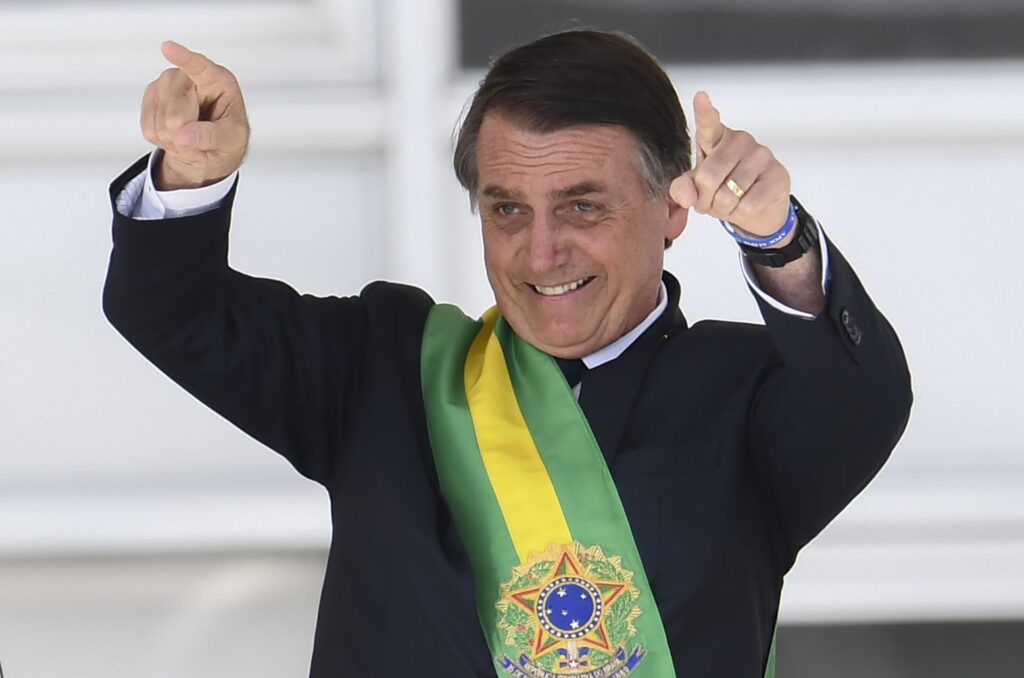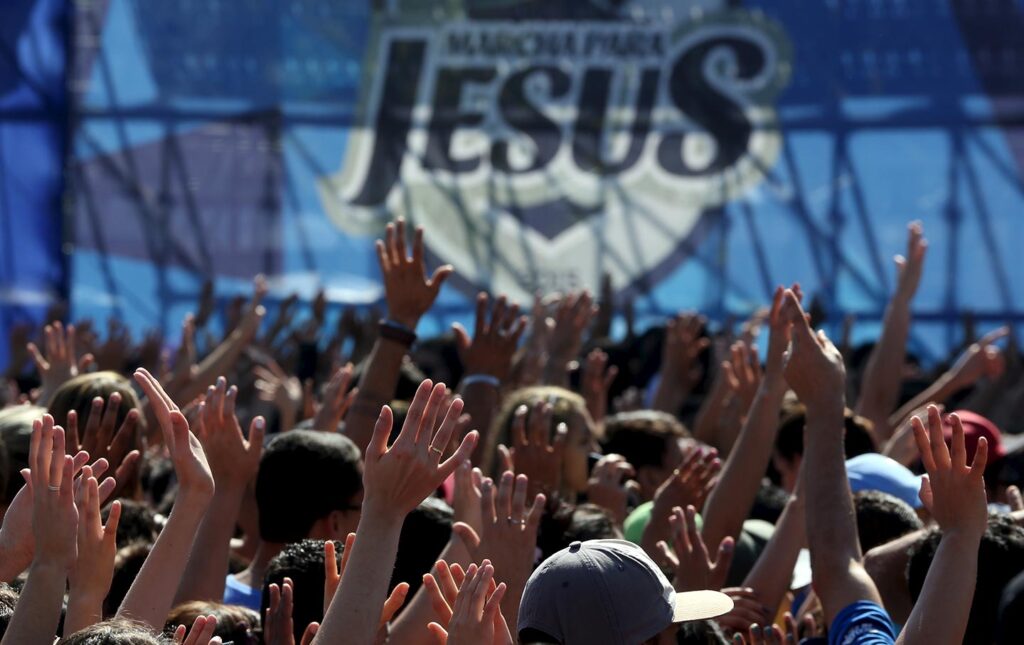The Brazil Riots, Bolsonaro, and Spiritual Warfare
Pentecostalism and its influence on Brazilian politics

(January 2023 riots in Brazil. Image source: Sergio Lima for Getty Images)
On January 8, 2023, supporters of Brazil’s former president, Jair Bolsonaro, rioted in the capital’s government buildings to try to retake the country and to encourage the Brazilian military to perform a coup d’etat on Bolsonaro’s behalf. The moment bared a striking resemblance to the January 6, 2021 insurrection in the United States, and left observers with a surreal and somber sense of déjà vu.
The ideological and personality commonalities between Bolsonaro and Donald Trump are, themselves, uncanny: the two heads of state had public personas of “tell-it-like-it-is” macho-masculinity, they stoked right-wing populism to rise to power, and both instigated distrust of their countries’ electoral systems.
Bolsonaro and Trump also tapped into large swaths of conservative Christian voters to support their political rise. Both found overwhelming support among evangelicals and, specifically, among Pentecostals. Not only did many Pentecostals vote them into power, but they also gave Trumpism and Bolsonarismo a spiritual vigor that baptized their right-wing politics as a cosmic spiritual battle between forces of good and evil.
Brazil’s rioters, like many at the January 6 insurrection, brought religion with them that day. Some were on their knees praying, and others were holding banners with Bolsonaro’s image and the inscription Deus Acima de Todos – or “God above all.” Even in the months leading up to the January 8 riots, Bolsonaro supporters protested against the election results with religious acts, including the blowing of a shofar, a practice heralding spiritual warfare commonly found within many Pentecostal communities (and something also witnessed in the days leading up to the January 6 insurrection).

(January 2023 riots in Brazil. Image source: Sergio Lima for Getty Images)
Bolsonaro, a thrice-married, professed Roman Catholic and former military officer in the Brazilian army during the military’s 1964-1985 dictatorship, first became president of Brazil in 2019, before losing to former (and now current) president, Luis Inácio Lula da Silva (or “Lula”) in the 2022 election. His first campaign was successful, in large part, because of the support from Brazil’s evangelicals, especially from the country’s sizeable population of conservative Pentecostals.
Bolonsaro worked hard to garner their support. Baptized on live television by a prominent Pentecostal pastor, the politician, whose wife and son identify as evangelical, established deep ties with Brazil’s evangelical and Pentecostal communities. While Bolsonaro continued to identify as Catholic, his relationship with Brazil’s Catholic population deteriorated rapidly from his first presidential run in 2018 to now.
As voters, Brazilian Catholics tend to hold more liberal positions on abortion, same-sex marriage and premarital sex than Brazil’s evangelicals. And a third of Brazil’s Catholic Bishops openly criticized Bolsonaro in 2020 for his failures in dealing with the COVID-19 pandemic. While roughly half of Brazil’s Catholics voted for Bolsonaro in 2018, Catholic support for Bolsonaro dropped by almost half to 28% in his 2021 campaign run, overwhelmingly backing Lula.
Brazil is a deeply religious country. With a population of over 215 million people, it is currently the largest Roman Catholic country in the world, with Catholics making up roughly half of its population. Nevertheless, Brazil’s Pentecostals are the fastest growing religious group in the nation and have overtaken the religious landscape. In 2020, roughly 31% of Brazil’s population identified as “evangelical.” In the most recent and available data, Pentecostalism constitutes about 80% of Brazil’s evangelical Christians.
To be clear, not all evangelicals and Pentecostals are Bolsonaro supporters. Brazil’s evangelicals and Pentecostals were also key in Lula’s presidential wins in 2003, 2006 and 2021, and were part of grassroots efforts to prevent a Bolsonaro second term. Pentecostalism’s rapid rise, and its majority status within Brazil’s evangelical community, has made garnering Pentecostals’ political support even more vital for anyone hoping to work across Brazil’s political spectrum.

(Bolsonaro in January 2023. Image source: CNN)
“Brazil’s evangelicals were obviously instrumental in Bolsonaro’s rise and a key part of his multi-sectoral coalition to win the presidency,” said John Polga-Hecimovich, associate professor of Political Science at the U.S. Navel Academy, who specializes in Latin American politics.
“I think that one very important similarity, and that goes for all Latin America as well as the United States, is that Bolsonaro attracted evangelicals largely through his stance on social issues. And especially on LGBTQ politics.”
Bolsonaro, from as early as 2011, has made numerous incendiary remarks about those in the LGBTQ community. Along with these comments, Bolsonaro positioned his 2018 presidential campaign as a war against “gender ideology,” a vague term that conservative activists have used to describe the policies and activism of feminists, as well as LGBTQ communities. Combatting “gender ideology” also became a prominent battle cry with the rise of Pentecostalism in Brazil and the rest of Latin America.
While Brazil’s right-wing politicians and activists were fixated on opposing gender and LGBTQ+ rights, America’s right-wing was focused on abortion and overturning Roe V. Wade. Trump hardly took on LGBTQ issues in his 2016 and 2020 campaigns, and is noted for moderating the GOP’s stance toward LGBTQ communities. However, Trump’s 2024 campaign is currently making gender and sexuality key issues, in part, to re-galvanize the religious base who voted him into power in 2016 and who need a new rallying issue in a post-Dobbs America.
As Trump courts those in favor of Christian nationalism, an ideology that aims to establish America’s political identity as “Christian,” Bolsonaro and his supporters are doing something similar. But to understand Christian nationalism in Brazil, one needs to consider two factors that separate Brazil from the United States: the demographics that make up Bolsonaro’s supporters, especially his Pentecostal factions, and the history of Brazil itself.
***
Brazil, following its independence from Roman Catholic Portugal in 1822, maintained its own monarchy until 1889 when it officially became a republic. Between monarchies, republics, and military dictatorships, Brazil’s history throughout the late 19th and 20th centuries was rife with coups, authoritarian governments, and periods of democratic elections. Under Brazil’s patriarcalismo, post-independence, from the early 19th-century up to its first Republic in 1889, the monarchy and regional oligarchical networks heavily enforced traditional gender norms and a racial hierarchy between Blacks and whites (slavery was not abolished until 1888). Decades later during the 1964-85 military dictatorship, the military justified its takeover through rhetoric of protecting “family values” that they said were under attack by 1960s counterculture and changing gender and sexual mores in Brazil.
Today’s right-wing in Brazil holds a similar yearning for an imagined period in Brazil’s past that was morally stringent. “We’re seeing in Brazil’s right-wing the construction of a kind of a nostalgia for a past that is mythologized as more godly, more moral, more hetero-patriarchal, and with a religious fervor,” said Benjamin Cowan, professor at University of California, San Diego, who specializes in Brazil’s post-Cold War history.
Although those on the right are turning to the past to remake Brazil today, right-wing Catholics and evangelicals sometimes look to different periods in Brazil’s history for what should serve as Brazil’s ideal, even as they often vote along similar lines.
“There is within Brazil’s right a faction that mythologizes and looks back toward that imperial period, and towards the monarchy itself, as a kind of fabled ‘high point’ of Brazilian society and civilization. It is not necessarily a Catholic position, but it’s deeply bound up with Catholicism,” Cowan said.
Many of Brazil’s evangelicals, including the Pentecostals, fondly remember the 1964-85 military dictatorship as a culturally stable period due to its anti-communist ethos and protections from social liberalism, despite its harsh repressions on basic human rights. Today, Brazil’s right-wing politicians, including Bolsonaro himself, have praised the 1964 military coup, arguing that the coup successfully prevented communism from taking over the country.
“One element of the idea in the myth-making task for the political right in Brazil — and particularly for religious conservatives — is the idea that communism is a threat to the faith and that communism has been enabled by the waning of authoritarianism since the dictatorship,” said Cowan.
In the United States, in addition to decrying communism, the religious right has described “political correctness,” the “gay agenda,” and “wokeism” as threats to the faith. Religious conservatives see these things as dangerous to “believers” and to the country’s moral standing before God. And for those on the religious far-right, they have framed these issues, and America’s political dynamics, as “spiritual warfare.”
In the Pentecostal orbit, spiritual warfare is an outlook based on the belief in a cosmic battle between the forces of good and evil, the existence of angels and demons who carry out this combat, and the belief that these forces shape humans in both individual and collective ways. In the United States, Donald Trump’s spiritual advisor, Paula-White Cain, who notoriously called for “angelic reinforcements” to combat “election fraud” following Trump’s 2020 election loss, is a classic example of how spiritual warfare plays out religiously and politically.
Brazil’s right-wing also utilizes spiritual warfare politically. But compared to the U.S. and the West more broadly (where institutional religion has been on a steady decline for decades), the practice and rhetoric of spiritual warfare in Brazil has spread in tandem with the rapid growth of Pentecostalism itself.
***
Pentecostalism is one of the U.S.’s most prominent religious exports. The movement, originating around the early 20th century, initially emphasized practices and prohibitions that consecrate a dedicated religious lifestyle (such as wearing modest clothing and eschewing alcohol and tobacco), and emphasized an experiential relationship with God. The physical manifestation of glossolalia (speaking in tongues) as evidence of being filled with a divine presence via God’s third person of the Christian Trinity—the Holy Spirit, is one prominent example of this classical form of Pentecostalism.
The movement quickly spread globally, and travelled to Brazil through the efforts of American and European missionaries in the early half of the 20th century. It was during this period when American Pentecostal denominations like the Assemblies of God, the International Church of the Foursquare Gospel, and the Church of God (Cleveland, Tennessee) firmly established themselves in Brazil’s religious landscape. Brazil’s Assemblies of God is currently, by far, the largest Pentecostal denomination in the country with over 14 million members.

(Brazilian Pentecostals. Image source: Paulo Whitaker for Reuters)
In the 1970s and 80s, indigenous Pentecostal denominations and churches started to spring up around Brazil. Highly influential megachurches, including the Universal Church of the Kingdom of God (Igreja Universal do Reino de Deus), and the Reborn in Christ Church (Igreja Renascer em Cristo) originated during this period. Referred to in Latin America as “Neo-Pentecostalism,” this new iteration of Pentecostalism emphasized less on speaking in tongues and personal morality—like its traditional Pentecostal counterparts—and more on receiving God’s physical and financial favor as a sign of strong faith, a Christian theology typically called “prosperity gospel.” These Neo-Pentecostal leaders also emphasized spiritual warfare.
Spiritual warfare has deeply influenced political rhetoric in Brazil today. Bolsonaro framed his campaign against Lula as a battle between good and evil, with Bolsonaro as God’s standard-bearer. Even Lula claimed that Bolsonaro himself was “possessed by the devil” when Lula first began his campaign against him.
This blossoming of Neo-Pentecostalism in Brazil coincided with the 1985 fall of the military dictatorship and the start of Brazil’s fifth republic—a democratic government that finally allowed civil-society groups, including churches, to participate in Brazil’s political process. Evangelical churches began to endorse candidates and political parties publicly, and certain political parties intentionally aligned themselves with megachurches. For Pentecostals, Brazil’s new political process was the ideal moment to start influencing Brazil’s affairs and to carry out God’s orders.
“I see this political engagement in the 1980s and 90s as having its theological and political reasons, but it’s also this Pentecostal ‘coming of age’ — a lot of these churches have become influential, wealthy, and powerful,” said Virginia Garrard, a religious studies professor at the University of Texas, Austin who specializes in Latin American Pentecostalism.
This iteration of Pentecostalism – one that engages in spiritual warfare and aims to take “dominion” over the nation – is one that is both uniquely Brazilian, as well as an American export. In fact, from the 1980s to today, U.S. and Brazilian Pentecostals have influenced each other through the sharing of speakers in conference circuits, book-selling between their borders, and televangelism and social media. The Pentecostal bases behind Trump and Bolsonaro undoubtedly intermingled and shared similar information networks.
“Trump’s Pentecostal and Charismatic bases was/is transnational in its reach and in their ambition—they aimed to share their version of the gospel with the world, not just the United States, and their media networks are global. The same applies to many of Bolsonaro’s supporters,” said Leah Payne, associate professor of American religious history at George Fox University and Portland Seminary.
“They seem similar, in other words, because many key leaders are collaborating with one another.”
***
It’s easy to see such stark similarities between Trump and Bolsonaro’s Pentecostal bases and to forget that they are living and operating in completely different contexts, but some of America’s culture-war issues do not map onto Brazil’s religio-political scene perfectly.
Brazil’s evangelicals tend to hold more moderate positions than American evangelicals, who generally pick up their social policy cues directly from the Republican Party and Fox News. Brazil’s evangelicals hold views that, in the U.S., might be considered more centrist or left leaning. They generally have concerns about environmental issues and deforestation, and also tend to support welfare programs and affirmative action. The highly influential pastor of Brazil’s Universal Church and Bolsonaro supporter, Edir Macedo, publicly stated that legalizing abortion would ultimately prevent many of Brazil’s social ills, diseases, and deaths, a position not commonly held in evangelical Christian circles.
But race and class are key facets to understanding Brazil’s Pentecostals and their politics, especially those who are Bolsonaro supporters. While there are certainly Neo-Pentecostal megachurches that have achieved wealth and political influence, the majority of Brazil’s Pentecostals tend to be made up, by far, of poor, Black, and female members of society. And Brazil’s Pentecostal churches are most found in favelas—shantytowns and working-class neighborhoods in the outskirts of Brazil’s large cities, as well as in rural areas.
In the United States, support for Donald Trump and Christian nationalism is usually coded in terms of nativism and white supremacy, in part, because of the significant portions of white people who supported Trump in 2016 and 2020. In 2018, while Bolsonaro certainly polled at the top from white voters, he also polled as the top candidate by Black and mixed-race voters by 47%, compared to his left-wing opponent who polled around six digits below in these same demographics. Since Bolsonaro has a penchant for racist comments against Blacks and indigenous peoples, it might seem contradictory to see strong Bolsonaro support from minority groups. But the truth is that neither the political left nor right has earned the loyalty of Brazil’s marginalized because they have never historically served them.
Brazil’s society is plagued with an extreme wealth inequality gap with the second highest concentration of wealth in the world. In 2021, almost 30% of Brazilians received a monthly income per capita of roughly $99 USD. Brazil’s successive governments have failed to provide public goods (like education, investment in transportation, etc.), to marginalized populations, leaving millions to fall under the poverty line, especially those of Afro-Brazilian descent.
For Brazil’s marginalized, the state is absent; and where the state is absent, Pentecostal churches have filled in the gap. Pentecostal churches consistently provide support networks in Brazil’s favelas in the form of access to welfare and assistance for its members, as well as opportunities to serve the church irrespective of social-status or gender (a much different situation in Roman Catholicism, where it takes a considerable amount of time to receive ordination, and where women cannot become priests). The popularity of the “Prosperity Gospel” within Brazilian Pentecostalism — the belief that having faith in God will guarantee “blessings” in the form of financial success and physical health, imbues a vitality and hope within Brazil’s poorer communities where Pentecostalism is flourishing. And the idea that spiritual warfare can combat and expel the demons in one’s life that cause poverty, disease, and internal ennui, is especially empowering to those on the margins.
“From a certain standpoint, if you’re an impoverished Afro-descended Brazilian, and there has never been a ruling class, never been an institution, never been a government that has assisted you in any way—why not turn to Pentecostals?” Cowan rhetorically asked during our phone conversation.
“I think there’s a way in which there’s a white supremacy built into that the presumption is, ‘They’re not voting what’s in their vested interests.’ The truth is that even voting isn’t necessarily in the interests of poor Black or Brazilians because they have never really received the benefits of the state or society in any way.”
***
Brazil is no outlier vis-á-vis the rise of Pentecostal growth and its involvement in national politics. Pentecostalism has been on the rise in Latin America, and in other parts of the Global South, for decades, and is continuing to grow and weaken Roman Catholic dominance in Central and South America. And its growth is matched with its rising political clout throughout the Americas.
Costa Rica, in 2018, saw a Pentecostal candidate running on an anti-LGBTQ platform, winning 40% of the country’s vote in the presidential election. In Bolivia, following the resignation of left-wing president Evo Morales for accusations of manipulating electoral results following the 2019 presidential election, Neo-Pentecostal spiritual warfare rhetoric galvanized anti-Morales demonstrators. Jeanine Añez, the self-appointed interim president following Morales’ departure from the Bolivian presidency, held up a large Bible in her hand as she took office, telling Bolivians, “God has allowed the Bible to come back to the Palace.” Her brother is a pastor at a Neo-Pentecostal church.
“As those populations continue to grow, they’re going to make up a larger subset of the electorate and be more powerful, and they’re going be more powerful for the same way that it’s a powerful group in the United States — because they’re organized. Religious groups are organized,” Polga-Hecimovich told me over Zoom.
“Certainly, in the Americas, this is a voting block that is here to stay.”
Miguel Petrosky is an essayist, writer, and journalist based in Washington, D.C. and has written for The Revealer, Sojourners, Religion & Politics, and Christianity Today. You can follow him on Twitter @petrosky_miguel.